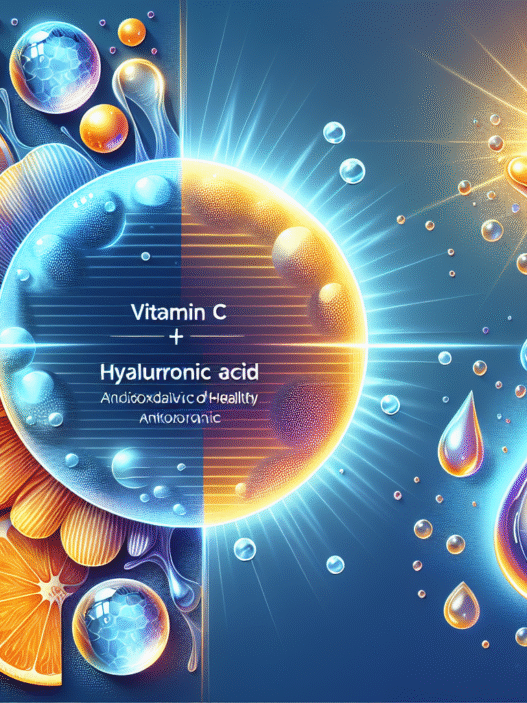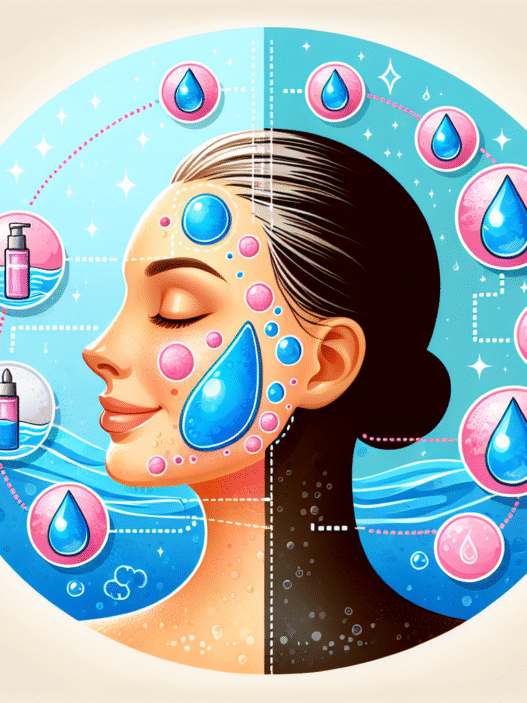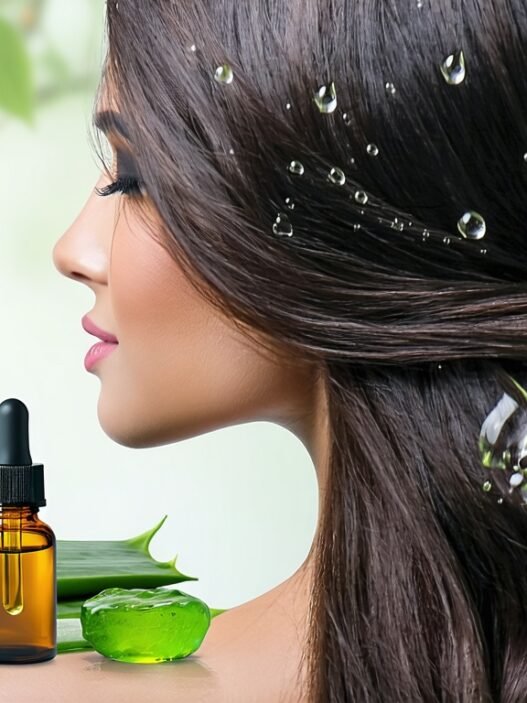Understanding Hyaluronic Acid
Hyaluronic acid (HA) is a naturally occurring substance in the body, primarily found in connective tissues, skin, and cartilage. It plays a significant role in skin health and overall hydration, making it a popular ingredient in beauty and skincare products.
Benefits of Hyaluronic Acid
Hyaluronic acid offers numerous benefits for the skin, primarily due to its extraordinary ability to retain moisture. Here are some of the main advantages:
- Hydration: HA can bind up to 1000 times its weight in water, acting as a humectant that draws moisture into the skin (Healthline). This quality helps keep the skin hydrated and plump.
- Improves Skin Tone: Studies have shown that topical hyaluronic acid can enhance skin tone and texture (Medical News Today).
- Increases Epidermal Thickness: Regular use of HA can contribute to improved skin barrier function by promoting skin thickness, which can help shield against environmental stressors.
Benefits of Hyaluronic Acid:
| Benefit | Description |
|---|---|
| Hydration | Retains moisture, keeping skin plump. |
| Improved Tone | Enhances overall skin appearance. |
| Epidermal Thickness | Supports skin barrier protection. |
Importance of Hyaluronic Acid in Skin Health
The significance of hyaluronic acid in skin health cannot be overstated. It plays an essential role in various physiological processes, particularly wound healing and skin hydration.
Hyaluronic acid’s involvement in wound healing is notable; it regulates inflammation and aids in the healing of minor wounds, such as burns, as well as more significant injuries like postoperative scars (Medical News Today). This property emphasizes its importance as a therapeutic component in skincare products.
Furthermore, HA contributes to maintaining skin integrity by minimizing transepidermal water loss. By retaining moisture and forming a protective barrier, it prevents dehydration and supports skin elasticity, making it historically prominent in anti-aging formulas and products aimed at reducing the appearance of wrinkles.
Hyaluronic acid is a pivotal ingredient that enhances skin health, targeting a wide array of concerns from hydration to regeneration. For more information on its effects, consider exploring our articles on what does hyaluronic acid do to your skin? and the compatibility of HA with other products, like vitamin C and hyaluronic acid.
Hyaluronic Acid in Skincare
Hyaluronic acid (HA) plays a significant role in skincare routines, valued for its hydrating, restorative, and healing properties. This section focuses on its topical applications, oral supplementation, and effectiveness in wound healing.
Topical Applications of Hyaluronic Acid
Topical hyaluronic acid has garnered attention for its ability to enhance skin hydration, tone, and thickness. Studies indicate that when applied directly to the skin, hyaluronic acid can bind up to 1,000 times its weight in water, acting as a humectant that effectively holds moisture in the skin (Healthline). This characteristic is particularly beneficial for those with dry or dehydrated skin.
| Benefits of Topical Hyaluronic Acid |
|---|
| Improves skin hydration |
| Enhances skin tone |
| Increases epidermal thickness |
In a study featuring 123 females of varying ages and skin types, significant improvements in skin hydration were noted following the application of topical hyaluronic acid. Regular use of hyaluronic acid serums or creams is often recommended for maintaining optimal skin moisture levels.
Oral Hyaluronic Acid for Skin Hydration
Recently, oral forms of hyaluronic acid have become popular as a supplement for improving skin hydration. Research suggests that ingesting hyaluronic acid can lead to noticeable improvements in skin moisture levels as well. This method may serve as a complementary approach to topical products, helping individuals achieve overall skin health and hydration.
| Oral Hyaluronic Acid Benefits |
|---|
| Enhances skin hydration |
| May improve skin elasticity |
| Supports overall skin health |
Incorporating oral hyaluronic acid into a skincare regimen can provide an additional layer of hydration; however, individuals should consult with healthcare professionals before starting any new supplements. For more details on skin hydration, refer to what does hyaluronic acid do to your skin?.
Hyaluronic Acid in Wound Healing
Hyaluronic acid is also known for its vital role in wound healing. Research has shown that HA can regulate inflammation and assist in the healing process of minor wounds, such as burns, as well as more severe injuries like postsurgical scars (Medical News Today).
| Role of Hyaluronic Acid in Wound Healing |
|---|
| Regulates inflammation |
| Promotes healing of minor and severe wounds |
| Assists in skin regeneration |
Topical creams or gels containing hyaluronic acid may be applied to wounds to aid in the recovery process, ensuring that the skin retains adequate moisture during healing. Proper use of such products can significantly impact the effectiveness of treatment. For additional insights, explore the disadvantages of hyaluronic and understand how they relate to safety during usage.
Safety and Precautions
Understanding the safety and precautions associated with hyaluronic acid is essential for those considering its use in their skincare routine. Although hyaluronic acid is generally safe, there are potential side effects and allergic reactions that individuals should be aware of.
Side Effects of Hyaluronic Acid
Hyaluronic acid products, particularly those that are injected, can sometimes lead to side effects. Some common side effects may include:
| Side Effect | Description |
|---|---|
| Redness | Temporary redness at the site of injection or application. |
| Swelling | Mild swelling around areas where hyaluronic acid is applied. |
| Itching | Some individuals may experience itching at the application site. |
These side effects are typically mild and resolve within a week Medical News Today. However, more severe complications, though rare, like infections or tissue necrosis, may require medical intervention.
Allergic Reactions and Risks
Individuals with a history of severe allergic reactions, such as anaphylaxis, should exercise caution when using hyaluronic acid. While rare, severe allergic reactions can occur, and it’s critical to recognize the potential risks involved. People who experience any alarming symptoms after using hyaluronic acid should seek immediate medical attention. Medical News Today recommends consulting with healthcare professionals before starting any new treatment, especially for those with underlying health conditions.
Safety During Pregnancy and Breastfeeding
The safety of hyaluronic acid during pregnancy and breastfeeding remains largely unknown. Pregnant or lactating individuals should consult a healthcare professional before using hyaluronic acid products to ensure safety for both mother and child Medical News Today. It’s vital to prioritize safety during these sensitive periods, as the effects of ingredients used can have varying implications for maternal and child health.
By being informed about the potential side effects, risks, and safety precautions surrounding hyaluronic acid, individuals can make better choices for their skincare routine. For further insights into its benefits and proper applications, visit our sections on what does hyaluronic acid do to your skin? and what are the disadvantages of hyaluronic?.
Practical Applications of Hyaluronic Acid
Hyaluronic acid has gained popularity in beauty and healthcare industries due to its multiple applications and benefits. Its versatility makes it an essential ingredient in various products and treatments.
FDA-approved Uses of Hyaluronic Acid
Hyaluronic acid injections are FDA-approved for use in relieving knee pain for individuals suffering from mild to moderate osteoarthritis when other treatments have not proven effective. A review of 38 studies conducted in 2022 highlighted that these injections are generally safe and effective (Medical News Today). This regulatory approval underscores the efficacy of hyaluronic acid beyond skincare, making it a valuable option in medical applications.
Effectiveness in Skin Aging
When it comes to skin health, topical applications of hyaluronic acid are notable for their effectiveness in addressing the signs of aging. Studies have demonstrated that hyaluronic acid can boost skin hydration, improve tone, and enhance epidermal thickness. These benefits have been particularly observed in facial rejuvenation procedures, as well as in treating skin affected by photoaging.
| Benefits of Topical Hyaluronic Acid | Observations |
|---|---|
| Skin Hydration | Improved moisture retention |
| Skin Tone | Enhanced radiance and uniformity |
| Epidermal Thickness | Increased skin plumpness |
Learn more about what hyaluronic acid can do for your skin in our article on what does hyaluronic acid do to your skin?.
Use in Joint Health and Wound Healing
Hyaluronic acid plays an important role in wound healing by regulating inflammation and promoting moisture, which is crucial for preventing infections. It is particularly effective in treating minor wounds, including burns and postsurgical scars. The application of topical hyaluronic acid has been shown to enhance recovery and aid in the overall healing process (Medical News Today). Additionally, its application is beneficial for joint health, particularly aligning with its FDA-approved use for alleviating osteoarthritis-related pain.
In summary, hyaluronic acid serves a variety of practical applications, from skincare to joint relief and wound healing. It remains crucial for individuals to consult with healthcare providers before incorporating hyaluronic acid into their routines, ensuring safe and effective use. For further insights into its benefits, examine our piece on does hyaluronic acid help wrinkles?.
Optimal Use of Hyaluronic Acid
Hyaluronic acid can be a beneficial addition to a skincare routine, but understanding its optimal use is essential to maximize its effects and ensure safety.
Proper Use of Hyaluronic Acid Products
Hyaluronic acid products include serums, creams, and injectable treatments. Over-the-counter formulations are generally safe for application on the skin or oral intake, while prescription products should only be used as directed by a healthcare professional. Here are some guidelines for proper use:
| Type of Product | Application Method |
|---|---|
| Serum | Apply to clean, damp skin. Use a few drops and gently pat it in. |
| Cream | Use after serum; apply a dime-sized amount to face and neck. |
| Injectable | Only administered by qualified medical practitioners; follow their instructions carefully. |
Individuals with various skin types, including sensitive or acne-prone skin, can safely use hyaluronic acid. It is advisable to consult with a dermatologist for personalized product recommendations and advice tailored to specific skin concerns, such as what does hyaluronic acid do to your skin?.
Dosage and Administration
When using topical products, the amount of hyaluronic acid can depend on the formulation’s concentration. Generally, a concentration of 0.1% to 2% is effective for serums. Creams may contain a higher viscosity but typically should still be applied in moderation.
Using hyaluronic acid supplements also requires a cautious approach. Its effective dosage can vary; therefore, consulting a healthcare provider is recommended before integrating supplements into a routine. This step is important for safety, considering possible interactions or contraindications.
Combination Applications and Safety
Combining hyaluronic acid with other skincare products can enhance its benefits; however, caution is necessary. Not all combinations are effective or safe. For instance, while many people pair hyaluronic acid with vitamin C, the interactions can vary between individuals (what do vitamin c and hyaluronic acid do?). It is also important to know what not to mix with hyaluronic acid? to avoid adverse reactions.
Consultation with a dermatologist can provide tailored advice on the best combinations for specific issues, such as does hyaluronic acid help wrinkles? or skin hydration.
In conclusion, proper use, dosage, and thoughtful combinations of products influence the effectiveness and safety of hyaluronic acid in a skincare regimen. Consulting professionals can help ensure the best results while minimizing risks.
Future Research and Applications
Ongoing Studies and Trials
Research continues to explore the role of hyaluronic acid (HA) in maintaining skin moisture and overall health. As a crucial molecule, HA plays a significant role in hydration, with its unique ability to retain water molecules. The loss of HA can lead to dehydration and loss of elasticity, often seen in aged skin, particularly in the epidermis (PubMed Central). Current studies are focusing on HA synthases (HAS), enzymes that produce HA chains of various lengths, and their regulation through growth factors such as keratinocyte growth factor and epidermal growth factor.
In understanding the turnover rate of HA, researchers have found that it has a half-life of 3 to 5 minutes in the blood, less than a day in the skin, and 1 to 3 weeks in cartilage. This rapid turnover suggests that optimizing HA levels could be pivotal in skincare and anti-aging solutions.
Potential Pharmacological Targets
The mechanisms through which HA is synthesized and degraded involve enzymes called hyaluronidases, essential for managing HA turnover in the skin. Investigating these enzymes may reveal new pharmacological targets, possibly leading to innovative treatments for age-related changes in skin.
Advancing the understanding of HYAL enzymes could pave the way for interventions that enhance HA production or inhibit its breakdown, potentially improving skin hydration and reducing signs of aging.
Addressing Age-related Skin Changes
Research has identified distinct alterations in HA homeostasis associated with age-related skin changes. For instance, premature aging due to UV radiation can lead to decreased HA levels and altered activity of HA synthases and hyaluronidases. Scrutinizing these changes can help distinguish between intrinsic and extrinsic aging, guiding dermatological approaches to counteract the visible effects of aging.
Further exploration of HA in skincare may yield effective solutions for conditions linked to aging skin. The ongoing studies aim to leverage the modifying abilities of HA to reverse or minimize these changes, enhancing skin integrity and appearance.
For more information on the benefits of hyaluronic acid, you can refer to articles such as what does hyaluronic acid do to your skin? and does hyaluronic acid help wrinkles?.





















